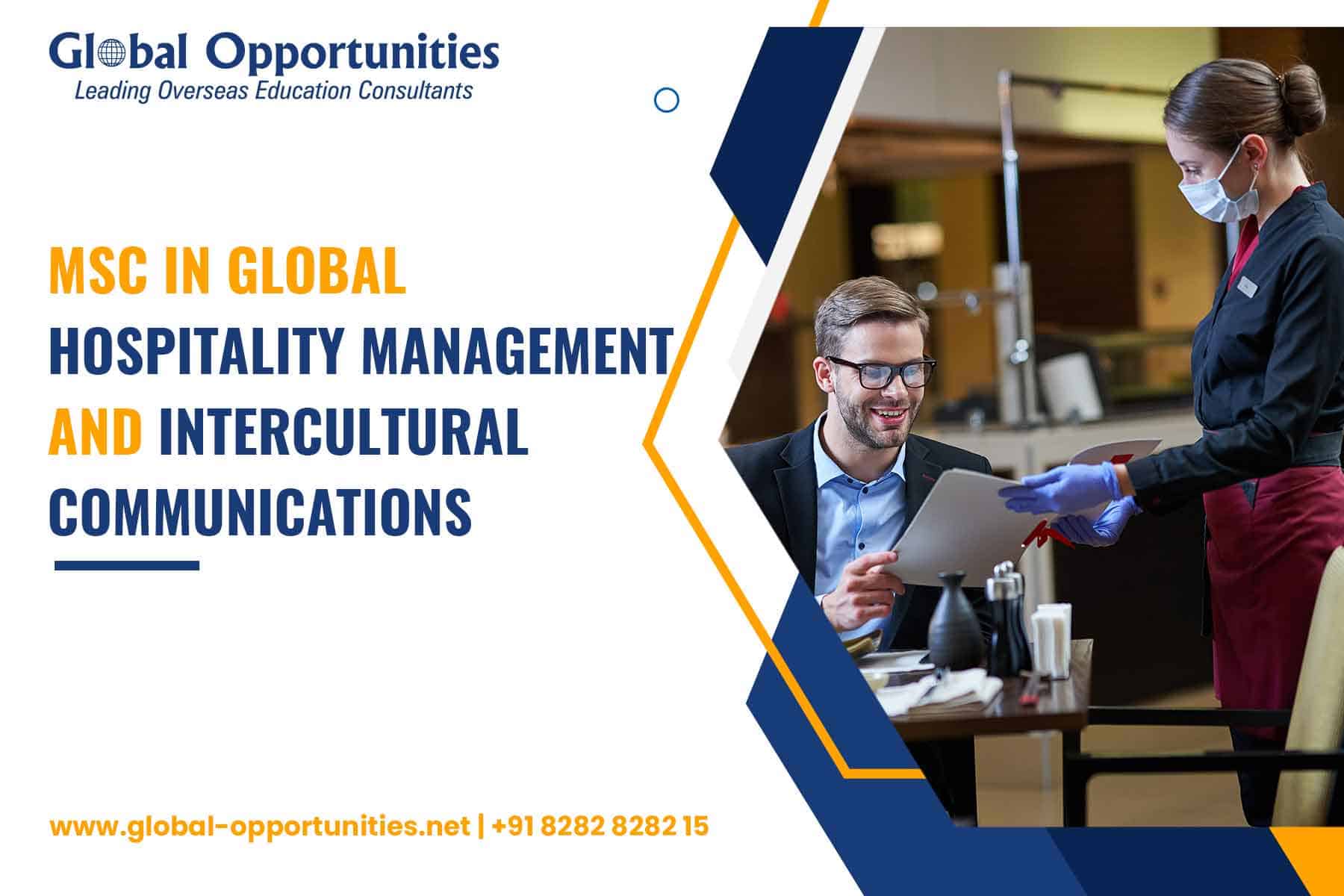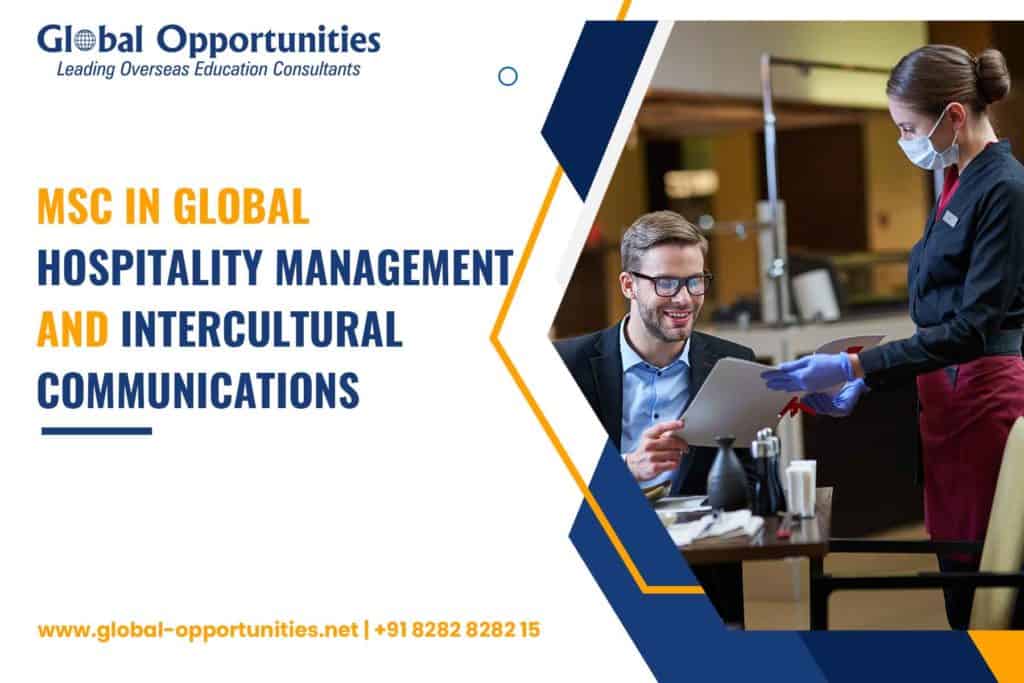MSc in Global Hospitality Management and Intercultural Communications

 “MSc in Global Hospitality Management and intercultural communications” focuses on developing and strengthening the knowledge and skills which are relevant to the hospitality industry. The hospitality jobs are diversified across business functions which includes hospitality and hotel operations, sales and marketing, revenue management, asset management and development,etc.
“MSc in Global Hospitality Management and intercultural communications” focuses on developing and strengthening the knowledge and skills which are relevant to the hospitality industry. The hospitality jobs are diversified across business functions which includes hospitality and hotel operations, sales and marketing, revenue management, asset management and development,etc.
Top Universities Offering MSc in Global Hospitality Management and Intercultural Communications & related courses are as follows:
| University Name | Degree Name | Location |
| Queensland University of Technology | Master of International Hotel and Resort Management | Brisbane, Australia |
| University of Surrey | MSc in International Hospitality Management | England, UK |
| National University of Ireland Galway | MSc in Global Hospitality Management & Intercultural Communication | Galway, Ireland |
| Cornell University | MSc in Global Hospitality Management and Intercultural Communications | New York, USA |
| Fanshawe College | Certificate in Hotel and Resort Services Management | London, Canada |
| Cranfield University | MSc in Management | England |
| The University of Sunderland | MSc in Tourism and Hospitality | Sunderland, United Kingdom |
| Kent State University | MS in Hospitality and Tourism Management | Ohio, US |
| New York University | MS in Global Hospitality Management | New York University, US |
| University of Essex | MSc in International Hospitality Management | England |
| University of Plymouth | MSc Tourism and Hospitality Management | Plymouth, England |
Curriculum Overview of MSc in Global Hospitality Management and Intercultural Communications:
The curriculum of this program is carefully crafted to provide students with a comprehensive understanding of both hospitality management and intercultural communication. Courses typically cover a wide range of topics, including:
- Hospitality Operations Management: Understanding the operational aspects of hotels, restaurants, and other hospitality establishments. It also offers business skills and acumen to work in a wide range of areas within the hotel premises.
- Intercultural Communication: Exploring theories and practices of communication across different cultural contexts.
- Global Tourism Trends: Analyzing the latest trends and challenges in the global tourism industry.
- Cross-Cultural Management: Developing skills to manage multicultural teams and navigate cross-cultural challenges.
- Strategic Marketing in Hospitality: Learning effective marketing strategies tailored to diverse cultural audiences.
- Ethics and Sustainability in Hospitality: Examining ethical issues and sustainability practices in the hospitality sector.
- Research Methods: Acquiring essential research skills to conduct studies in hospitality and intercultural communication.
Advantages of MSc in Global Hospitality Management and Intercultural Communications
The master of science in Global Hospitality management and Intercultural communications offers an infinite number of advantages for individuals who seek a career path in the hospitality industry and related fields. Some of the key advantages of pursuing this specialized graduate program includes:
- Multifaceted Skill Set: The program equips students with a diverse skill set that combines hospitality management expertise with intercultural communication proficiency. Graduates possess a unique combination of competencies, including leadership, communication, cultural sensitivity, and strategic thinking, which are highly valued in today’s globalized hospitality industry.
- Global Perspective: In an increasingly interconnected world, having a global perspective is essential for success in the hospitality sector. The MSc in Global Hospitality Management and Intercultural Communications exposes students to diverse cultural perspectives, international business practices, and global trends in hospitality and tourism. This broad understanding of the global landscape enhances graduates’ ability to navigate multicultural environments and adapt to different cultural contexts.
- Career Advancement Opportunities: Graduates of this program are well-positioned for career advancement in various sectors of the hospitality industry. Whether aspiring to work in hotel management, event planning, tourism development, or cross-cultural consulting, the specialized knowledge and skills acquired through the MSc program open doors to a wide range of career opportunities. Employers often seek candidates with advanced degrees and specialized expertise, giving MSc graduates a competitive edge in the job market.
- Networking Opportunities: The MSc in Global Hospitality Management and Intercultural Communications provides numerous networking opportunities for students to connect with industry professionals, alumni, and fellow students from diverse cultural backgrounds. These connections can lead to internships, job placements, mentorship opportunities, and valuable insights into the latest trends and developments in the hospitality industry. Networking also fosters a sense of community and support among students, enhancing their overall learning experience and professional growth.
- Experiential Learning: Many programs incorporate experiential learning components, such as internships, industry projects, study tours, and simulations, allowing students to apply theoretical knowledge to real-world scenarios. These hands-on experiences not only reinforce classroom learning but also provide valuable practical skills and industry exposure. Students gain invaluable insights into the day-to-day operations of hospitality establishments, develop problem-solving abilities, and build confidence in their ability to handle real-life challenges in diverse cultural settings.
- Cultural Competency: One of the distinctive features of the MSc in Global Hospitality Management and Intercultural Communications is its emphasis on cultural competency. By studying intercultural communication theories and practices, students learn to navigate cultural differences effectively, communicate with diverse stakeholders, and build strong relationships across cultures. This cultural sensitivity is not only essential for providing exceptional customer service but also for fostering inclusive work environments and promoting cross-cultural understanding in the hospitality industry.
- Research and Innovation: Some programs offer opportunities for students to engage in research projects and contribute to cutting-edge developments in the field of hospitality management and intercultural communications. By conducting research, students deepen their understanding of key issues and trends in the industry, develop critical thinking and analytical skills, and contribute to the advancement of knowledge in their chosen field. Research experience also enhances students’ credibility as experts in their respective areas of interest and opens doors to further academic or professional pursuits.
Entry Requirements for MSc in Global Hospitality Management and Intercultural Communications
The entry requirements for MSc in Global Hospitality management and Intercultural communications is:
- Candidate has an undergraduate degree, which is usually a second class honors or equivalent from an accredited institution.
- The degree should preferably be in hospitality management, tourism, business administration, or a related field, although some programs may accept candidates from diverse academic backgrounds.
- GPA: Many programs require a minimum Grade Point Average (GPA), often around 3.0 on a 4.0 scale or its equivalent in other grading systems.
- TOEFL (Test of English as a Foreign Language) – With a common minimum score requirement being around 80 to 100 for internet based tests.
- Students need to typically get IELTS (International English Language Testing System), where they candidates need to score a minimum of 6.5 to 7.0
- Letter of Recommendation: Applicants need to submit one or more letters of recommendation from academic or professional references. In these recommendation letters it should attest the applicant’s abilities, work ethics and potential for success in graduate studies.
- Statement of Purpose: This essay acts as a personal statement that allows applicants to articulate their academic interests, professional goals and reasons for choosing the specific program. In addition to this it also provides an opportunity to showcase personality traits, achievements and how the program aligns with career aspirations.
- Interviews: Some of the programs may conduct interviews which can be in-person, telephone or via video conferencing as part of the admission process to assess the applicant’s communication skills, motivation and suitability of the program.
Conclusion
In conclusion, the Master of Science (MSc) in Global Hospitality Management and Intercultural Communication represents a dynamic and forward-thinking approach to overseas education in the hospitality industry. By combining the principles of hospitality management with the nuances of intercultural communication, this specialized program equips students with the knowledge, skills, and cultural competency needed to excel in today’s globalized world.
Throughout the program, students gain a comprehensive understanding of hospitality operations, strategic management, and marketing strategies tailored to diverse cultural audiences. They also explore theories and practices of intercultural communication, learning to navigate cultural differences effectively and build strong relationships across cultures.
One of the key advantages of this program is its emphasis on experiential learning, providing students with opportunities to apply theoretical knowledge to real-world scenarios through internships, industry projects, and simulations. These hands-on experiences not only reinforce classroom learning but also enhance students’ problem-solving abilities and industry insight.
Moreover, the program fosters a global perspective by attracting a diverse cohort of students from around the world and offering networking opportunities with industry professionals and alumni. Through these connections, students gain valuable insights into global trends and developments in the hospitality industry, positioning themselves for success in a variety of career paths.
In today’s interconnected world, where hospitality businesses cater to an increasingly diverse clientele, the demand for professionals with expertise in both hospitality management and intercultural communication is on the rise. Graduates of the MSc in Global Hospitality Management and Intercultural Communication are well-equipped to meet this demand, serving as leaders and innovators in the global hospitality sector, promoting cross-cultural understanding, and delivering exceptional experiences to guests from all walks of life.
FAQs
Why choose MSc in Global Hospitality Management and Intercultural Communications?
The MSc in Global hospitality management and Intercultural communications is designed to mirror the increasing cultural and geographical variety within the hospitality sector; it is crucial to recognize its global nature. This industry thrives on human interaction and customization, drawing strength from the experiences offered by its workforce and the lasting impressions made by its patrons.
What is the duration of MSc in Global Hospitality Management and Intercultural Communications?
The duration of MSc in Global Hospitality Management & Intercultural Communications in general is 2 years, however there are some universities which offer this course in just 1 year (Advance Level)



